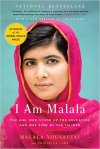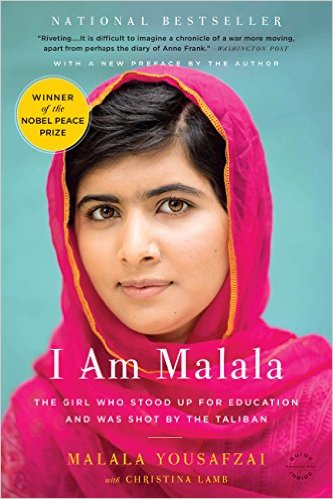
“We have no problems.” That’s what my husband, Greg, and I say to each other while watching the news on TV. The turmoil and suffering we see around the world make our own challenges and frustrations miniscule in comparison.
As my selection from Asia for the Around the World Reading Challenge, I chose I Am Malala: The Girl Who Stood Up for Education and was Shot by the Taliban. Malala Yousafzai is Pakistani, though her co-author, journalist Christina Lamb, is British. Malala is, of course, the 2014 winner of the Nobel Peace Prize for her activism on behalf of education.
This book humbled me. The descriptions of the hardships that the people of Pakistan face on a daily basis brought me to tears, as did the efforts of this young girl and her father to provide solutions through education.
In a culture where women are of little consequence, Malala’s father, Ziauddin Yousafzai, is atypical in that he unabashedly loves and respects his wife and daughter, so much so that he solicits and reflects on their opinions and advice. A teacher with a bachelor’s and a master’s degree in English, he advocated for education, especially of girls, before his own daughter was even born. He built the school Malala attended and served as its administrator.
Pakistan has had more than its share of natural disasters, such as a massive earthquake in 2005 that killed more than 73,000 people. In 2010, floods killed 2,000 people, affecting 14,000,000 people and destroying homes and 7,000 schools. The Pakistani government did little to help its people after these catastrophes; most aid came from Islamic organizations including TSNM, the Taliban of Swat, the region where Malala’s family lived. When the Taliban began moving into the area and expanding their influence, people remembered their assistance and felt obliged to support them. (There is a lesson here for the entire world.)
Mr. Yousafazai’s outspoken resistance to the Taliban’s restrictions against girls’ education earned threats of retaliation; but when he suggested to his daughter that they temporarily abandon their public outrcry, Malala objected:
“How can we do that?” I replied. “You were the one who said if we believe in something greater than our lives, then our voices will only multiply even if we are dead. We can’t disown our campaign!”
So their work continued, but with a tragic setback. After Malala and two classmates were shot by a Taliban gunman on their school bus, Malala was ultimately airlifted to Birmingham, England, where she was more likely to receive the level of care she needed for her recovery.
Though around the world she is recognized for her valor, in her native country there are those (sympathetic to extremist views, perhaps) who accuse her of using her circumstances to catapult herself into a life of luxury. Malala ignores the criticism, and instead focuses on her goal: universal access to education. Her father shares this objective in his work as the education attaché for the Pakistan consulate in England and as the advisor to the UN for global education.
I Am Malala is a must read. It goes beyond being a nice story about a courageous girl; it challenges the reader to support what is right, even if it leads to one’s own death.
Can your life story change the world?
This is my second installment in the Around the World Reading Challenge sponsored by the blog Booking It (click here). For my first installment, please see What is My Calling?
Take the ARHtistic License Survey!
I heard about this book, but after reading your post I included it on my list of “books to read”.
LikeLiked by 1 person
I think it will be well worth your time.
LikeLiked by 1 person
Reblogged this on ARHtistic License.
LikeLike